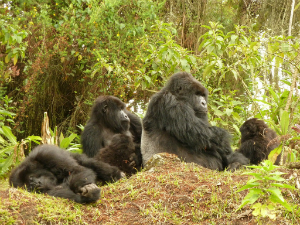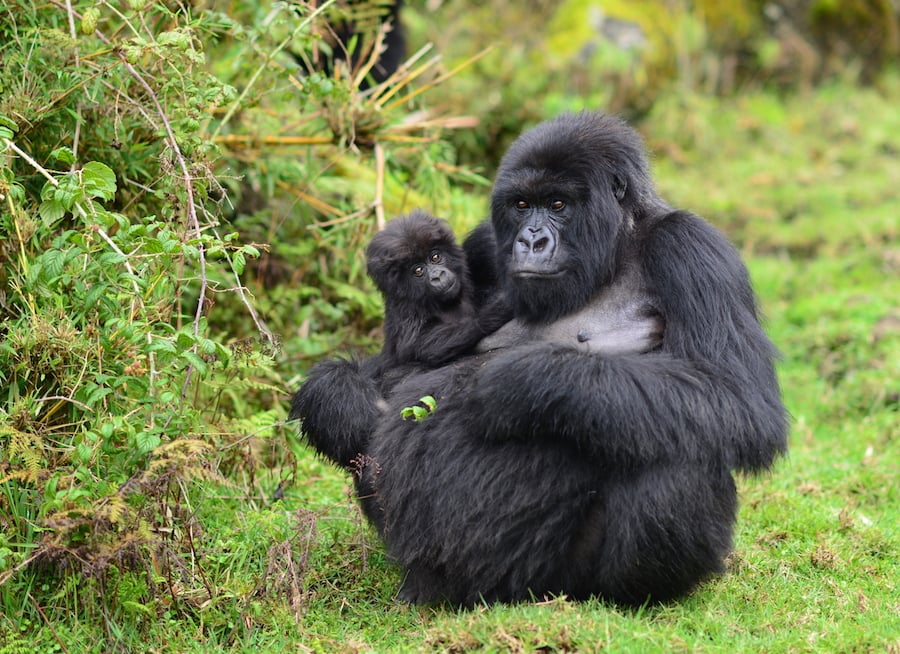August 17, 2012
Wageni Makes a Bold Move; What Does it Mean for Ugenda's Group?
 Ugenda’s group of mountain gorillas is known to the Dian Fossey Gorilla Fund field staff as calm and stable, with all of the group members generally getting along harmoniously. So it was somewhat surprising when on Aug. 10, the field staff observed the subordinate silverback, 17-year-old Wageni, pass dominant Ugenda in a brief attempt to lead the group’s movements.
Ugenda’s group of mountain gorillas is known to the Dian Fossey Gorilla Fund field staff as calm and stable, with all of the group members generally getting along harmoniously. So it was somewhat surprising when on Aug. 10, the field staff observed the subordinate silverback, 17-year-old Wageni, pass dominant Ugenda in a brief attempt to lead the group’s movements.
“Passing” is a behavior Gorilla Program Coordinator Veronica Vecellio describes as the most common indicator of a dominance shift. It is such a telling behavior because among gorillas, it is the sole privilege of the dominant silverback to interrupt the group’s activities in order to dictate the direction of their movement as well as their resting and feeding times and locations. Typically, if the dominant silverback gets up from a mid-day nap, for example, and begins to move off into the forest, all other gorillas in the group will also get up and follow him. When another gorilla tries to assert his authority by “passing," he usually receives a sharp rebuff by the dominant silverback, who will catch up to him and “pig grunt” at him, warning him to get in line.
Sometimes the gorilla who has attempted to pass will stop after being chastised and yield the leadership to the dominant silverback. But if he feels really up to the challenge, he might continue walking parallel to the dominant silverback, returning the pig grunts. This can lead to the subordinate gorilla taking the lead temporarily, but at other times, the dominant silverback prevails. Although a subordinate silverback passing a dominant silverback is not in itself indicative of a permanent shift in power, if it is seen frequently it usually points to a larger, ongoing shift in the group dynamics. Indeed, Wageni’s attempt to pass Ugenda recently was successful, though Fossey Fund field staff have some doubts about Wageni’s ability or desire to actually attempt to wrest dominance from Ugenda at this time. At 17, Wageni is still very young to take on the responsibility of protecting and leading his own group. Moreover, he usually rests and feeds at a certain distance from most of the other group members including the females, and female allegiances tend to play a role in changes of dominance.
Indeed, Wageni’s attempt to pass Ugenda recently was successful, though Fossey Fund field staff have some doubts about Wageni’s ability or desire to actually attempt to wrest dominance from Ugenda at this time. At 17, Wageni is still very young to take on the responsibility of protecting and leading his own group. Moreover, he usually rests and feeds at a certain distance from most of the other group members including the females, and female allegiances tend to play a role in changes of dominance.
Given the potential for competition among males, one might wonder why mountain gorillas ever live in multi-male groups. While it is true that silverbacks face less competition for females when they live in single-male groups, multi-male groups offer more protection for females and infants during interactions with other groups. The subordinate silverbacks will usually provide assistance to the dominant silverback in retaining females and preventing the other group’s silverbacks from killing infants. There can sometimes be mating opportunities for a subordinate silverback as well, if he is careful about which females he chooses and when he decides to copulate.
When dominance shifts do occur, we usually see them happen in three different ways: the dominant silverback dies and the subordinate male inherits his role; ongoing competition when the dominant silverback has not been in firm control for some time; and when the dominant silverback is aging and a younger silverback decides to try his luck. We have already seen a few dominance shifts occur among the groups monitored by the Fossey Fund.
 The most famous of these shifts occurred in Beetsme’s group, when dominant silverback Titus was finally deposed after a long challenge by his son Kuryama. Once he was the dominant silverback of his own group, Kuryama himself was eventually challenged by Kirahure, who became dominant in Kuryama’s group. Another successful shift occurred in Ntambara’s group when his younger brother Ugutsinda began to challenge Ntambara in 2010, and finally became dominant in 2011. Ntambara, however, remains in the group in the subordinate role.
The most famous of these shifts occurred in Beetsme’s group, when dominant silverback Titus was finally deposed after a long challenge by his son Kuryama. Once he was the dominant silverback of his own group, Kuryama himself was eventually challenged by Kirahure, who became dominant in Kuryama’s group. Another successful shift occurred in Ntambara’s group when his younger brother Ugutsinda began to challenge Ntambara in 2010, and finally became dominant in 2011. Ntambara, however, remains in the group in the subordinate role.
Fossey Fund staff can now only watch and wait to see how things unfold in Ugenda’s group and whether Wageni will continue to challenge Ugenda. The Fossey Fund has been monitoring Wageni since birth, and staff and researchers say that although they did not expect Wageni’s passing behavior, in some ways it fits in with what we know about his temperament. Vecellio says it is possible he was just stretching his wings and trying to pass Ugenda for the sake of the experience. Wageni is known for being active and bold — the kind of personality who might try passing Ugenda just to see if he could. Now that he has succeeded once he may be satisfied for the time being, or he may feel emboldened to continue challenging Ugenda. In any case, Wageni’s behavior caught our field staff’s attention, and made him a gorilla to watch in the coming months.






